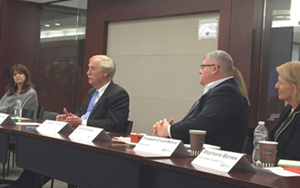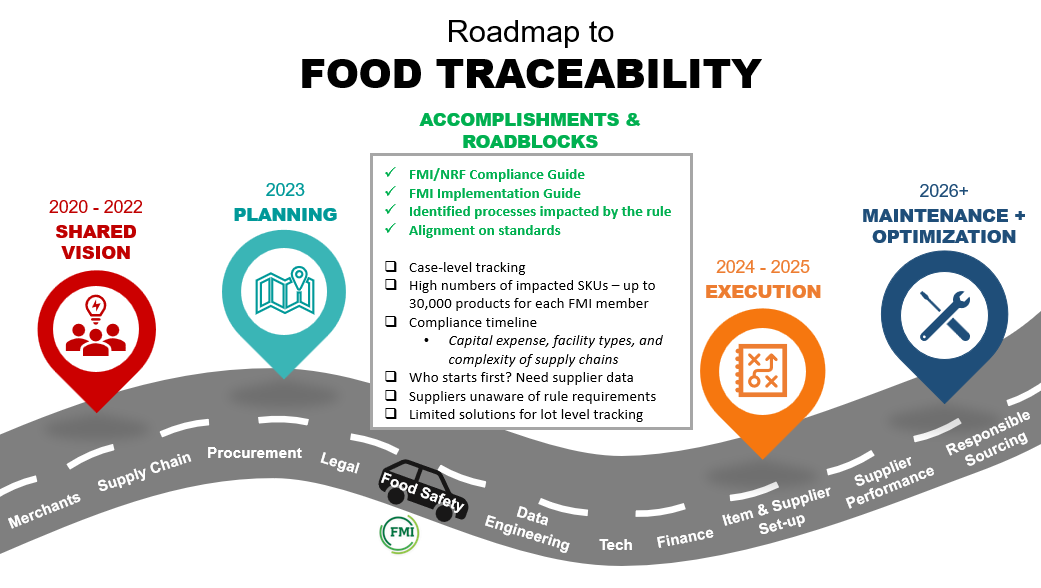By: Jennifer Hatcher, Chief Public Policy Officer & Senior Vice President, Government Relations

It is safe to say that most people will remember 2016 for tweet policy, hacked emails and then its surprising election results at the federal level, but we wanted to fill you in on what we did on your behalf this year.
The year of the regulation . . .
If there was a mantra for the final year of the Obama Administration, it was “Make this the year of regulation!” 2016 saw the Federal Register totaling over 90,000 pages and almost 500 significant regulations – a number of those affecting FMI members and most exceeding several hundred pages in length. If you are looking to find value in your FMI membership, try reading one of these regulations in totality and then you will be glad we have a team of folks to do that and give you only what you need to know!
Our work does not end with reading a regulation. In 2016, we put together nine webinars, issued regular timely regulatory alerts, filed 13 sets of industry comments, compiled several top-notch compliance guides and held countless meetings and calls with agency officials from the Secretary to the project manager to ensure we can influence, communicate and help implement rules. Major policy issues in 2016 on which we led efforts included: food safety and Food Safety Modernization Act implementation; overtime rule and the Fair Labor Standards Act (FLSA); menu labeling and the Affordable Care Act (ACA); and biotechnology disclosure.
Playing Offense and Defense in Congress on GMO/biotech, Menu Labeling, Debit/Swipe Fee Reforms and More . . .
As we approach the end of football season, perhaps the best analogy to discuss this year’s legislative activity is to say 2016 required that we play both offense and defense.
 Regarding GMO/biotech disclosure – we were able to eke out a win in overtime, not with a brilliant Hail Mary pass, but by sheer muscle and persistence. FMI members and state associations engaged fully with meetings with Senators, letters, calls and operational examples of the craziness.
Regarding GMO/biotech disclosure – we were able to eke out a win in overtime, not with a brilliant Hail Mary pass, but by sheer muscle and persistence. FMI members and state associations engaged fully with meetings with Senators, letters, calls and operational examples of the craziness.
Restaurant menu labeling remained a 2016 priority issue for FMI and our members, as the May 5, 2017 compliance date nears. FMI led more than 200 food retailers, companies, and organizations in pressing Congress to enact the Common Sense Nutrition Disclosure Act (H.R. 2017/S. 2217) to fix substantive problems with FDA’s application of “menu labeling” regulations at supermarkets. H.R. 2017 was passed with large bipartisan support in the House. FMI is continuing to work with Members of Congress and the Trump transition team to prioritize adoption of these needed implementation changes as soon as possible to avoid irreversible damage to supermarkets’ food offerings.
In 2016, opponents of the 2010 debit reforms increased their efforts to repeal the law. House Financial Services Committee Chairman Jeb Hensarling (R-TX) introduced legislation that would essentially repeal and replace Dodd-Frank, including the industry-supported debit reforms. In 2016, FMI participated in over 150 congressional meetings in support of the debit reforms and to oppose efforts to repeal the law. In addition to the numerous press meetings, letters, and Capitol Hill meetings, FMI’s Jennifer Hatcher authored op-eds to highlight the competition component of the debit reforms and how they have successfully fostered innovation and reliability while containing merchants’ costs. We are now working to engage impacted consumers.
State and Local Legislation, Ballot Initiatives Increasing in Number and Importance. . .

While Capitol Hill and the White House dominate the headlines, an increasing amount of policymaking has emanated at the state level in recent years. This year was no exception. In 2016, over 2,000 bills potentially impacting our industry were introduced in state legislatures. On top of this, over 160 initiatives qualified to appear on 35 stateballots this year. And if state legislatures are the “laboratories of democracy,” then city councils are the Bunsen burners – keeping the flames of activism burning. From plastic bag bans to paid sick leave mandates to restrictive scheduling and sugar taxes, cities, towns and counties in 2016 were a growing source of regulation on business. With the change in administration, this trend may only accelerate in 2017, as we learned in the FMI Regional State Legislative Meetings.
Fortunately, FMI is here to help wade through this staggering amount of legislative activity. FMI monitors over 80 issues affecting our industry at the state level and nine priority issues, as determined by our State GR Working Group, at the local level. When legislation moves, so do we, keeping you informed and ready. In 2016, we sent out 24 State Issues Reports and 52 Local Monitoring Reports, plus in-depth guides like our 2016 50-State Legislative Outlook and the State Ballot Measure Guide for the Grocery Industry. Additionally, we participated in two coalitions on two separate weights and measures issues with successful passage. Finally, FMI State Affairs responded to more than 300 research requests to assist members and state association executives.
Political Programs – the Power of Voter Education and Member Advocacy. . .
FMI’s Food PAC and LEAD are an important part of our grassroots efforts. This election cycle, FoodPAC raised $325,804 and contributed $233,346 to 107 candidates with a 93 percent reelection rate for FoodPAC-supported candidates. Thank you for your role in these efforts. Our political programs also ran a non-partisan voter information site providing information on registration, primaries, polling places, ballot initiatives and candidates. Some members even went a step further by providing their associates with information on specific ballot initiatives important to the company. FMI’s LEAD allows us to have funds to support political advocacy – public relations and research on behalf of a rule or bill or law, not a candidate. In 2016, we raised over $200,000 for LEAD with over $100,000 raised through the FMI Food Industry Golf Tournament at our Midwinter Executive Conference.
Communicating Via Timely Updates. . .
These are just a high-level overview of some of the important issues and events that occurred during 2016. FMI publishes a government relations report for its members that provides a detailed overview of the public policy developments from the past week. Please sign up for FMI’s GR Report or one of our many other policy newsletters if you or a representative from your company wish to receive regular communications about FMI’s public policy and advocacy work.
Next up in 2017 – Developing a Plan. . .
2017 is sure to have a fast start. We have already had meetings with many of newly elected members of Congress even before they have officially arrived in Washington and we will be engaging with all the new faces early on both the legislative and regulatory sides.
FMI is in the process of surveying its members to determine the industry’s priority policy issues for 2017 with the backdrop of a new president, cabinet secretaries and the new 115th Congress. Please, take time to make sure your voice is heard by sharing your priorities with our team and filling out our priority issues survey.

 Industry Topics address your specific area of expertise with resources, reports, events and more.
Industry Topics address your specific area of expertise with resources, reports, events and more.
 Our Research covers consumer behavior and retail operation benchmarks so you can make informed business decisions.
Our Research covers consumer behavior and retail operation benchmarks so you can make informed business decisions.
 Events and Education including online and in-person help you advance your food retail career.
Events and Education including online and in-person help you advance your food retail career.
 Food Safety training, resources and guidance that help you create a company food safety culture.
Food Safety training, resources and guidance that help you create a company food safety culture.
 Government Affairs work — federal and state — on the latest food industry policy, regulatory and legislative issues.
Government Affairs work — federal and state — on the latest food industry policy, regulatory and legislative issues.
 Get Involved. From industry awards to newsletters and committees, these resources help you take advantage of your membership.
Get Involved. From industry awards to newsletters and committees, these resources help you take advantage of your membership.
 Best practices, guidance documents, infographics, signage and more for the food industry on the COVID-19 pandemic.
Best practices, guidance documents, infographics, signage and more for the food industry on the COVID-19 pandemic.
